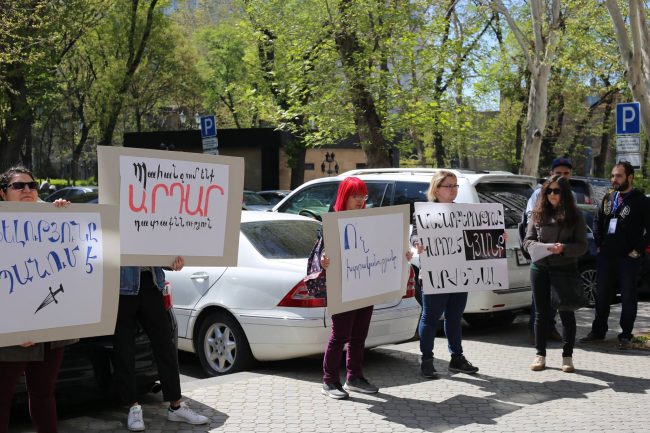
 On Friday evening, nine queer activists were attacked by ‘more than 30 people’ in the village of Shurnukh, in the southern Syunik region of Armenia. Two were hospitalised and six others with minor injuries were taken to the police station in Goris, the nearest town.
On Friday evening, nine queer activists were attacked by ‘more than 30 people’ in the village of Shurnukh, in the southern Syunik region of Armenia. Two were hospitalised and six others with minor injuries were taken to the police station in Goris, the nearest town.
On 2 August, several advocates for queer rights, women’s rights, and environmental issues got together at the home of a queer activist in Shurnukh. That evening, a group of locals, including women and children, gathered outside the house and demanded to talk with the activists. According to the Yerevan-based rights group Pink Armenia, as the activists exited the house, some of the locals threw rocks and attacked them. They also shouted homophobic slurs and called the rights advocates ‘Turks’.
The activists tried to avoid confrontation by leaving the area, but were pursued by the hostile group. Unable to stop the passing cars on the main road, the victims were attacked until police arrived at the scene and ordered a passing bus to transport them to Goris.
Robert, one of the victims of the assault and a staff member of Pink Armenia, told OC Media that he has stitches on this head, a swollen ankle, scratches, and bruises, but ‘the psychological damage is worse’. He said that the police got involved 90 minutes after they were called, but only when the activists came across a police car themselves while fleeing from attackers.
‘The police didn’t even bring enough cars to transport nine people like we asked them to. We had to stop a tourist bus for a ride. On the road back, we came across an ambulance, so two injured people, including myself, were transported straight to the hospital’, Robert said.
He also commented on the law enforcement officers’ conduct. ‘The police were very insensitive at first, asking “are you really gay” [hamaseramol, a derogatory term in Armenian], and behaving unprofessionally’.
The Executive Director of Pink Armenia, Mamikon Hovsepyan, told OC Media that three of their members were among the victims. In a statement, the advocacy organisation said that two of the queer activists assaulted on Friday had also been physically attacked on 21 April in Goris. The perpetrators of that assault visited the Shurnukh house the day before the latest attack. The April assault was reported to police as a hate crime, but the authorities failed to act and there have been no updates on the investigation. In light of this, Pink Armenia has urged police to prosecute the perpetrators of the recent attack, ‘to ensure the safety and security’ of activists.
On Saturday, police said they were investigating the recent assault and took several individuals in for questioning.
In 2017, Pink Armenia documented 30 cases of rights violations and discrimination spurred by sexual orientation and/or gender identity. In 14 of the cases, there was no legal follow-up.
Government silence
The Public Defender of Armenia reported that it’s in contact with the law enforcement in Goris to follow the investigation. In its statement on Saturday, however, Pink Armenia noted that the Public Defender’s office had not reached out to any of the victims. On 6 August, Robert confirmed to OC Media that no one from the Public Defender’s office had contacted him. He and other activists further criticised the office for failing to specify the nature of the attack in its statements. The Public Defender ‘didn’t even connect [the attack] with LGBT rights or hate crimes’, noted Robert.
Mika Artyan, a London-based blogger and gay activist, sees this as part of a trend, saying that politicians even avoid uttering ‘LGBT’ or ‘gay’ in their statements. In his blog post, Mika criticised the new Armenian authorities for remaining ‘silent’ about discrimination and violence against queer people. ‘This sends the wrong signal, that anti-LGBT attacks can be tolerated. They should send a very strong message that no violence, no human rights abuses, including based on sexual orientation and gender identity, will be tolerated in New Armenia. Until this situation changes, all the key government messages — spearheaded by Prime Minister Nikol Pashinyan — asking Armenians to return to Armenia, will remain shallow and unconvincing’, wrote Mika.
Mamikon Hovsepyan told OC Media that there has not been a statement from Pashinyan or his administration about the incident so far.
The US Embassy in Armenia has condemned the incident, saying that ‘the state is responsible for the safety and security of all Armenians’.
Negative attitudes
In a 2012 survey conducted by Pink Armenia in Yerevan, Gyumri, and Vanadzor — the three largest cities in Armenia — 19% of respondents described non-dominant sexual orientations as a ‘disease’, 13% as a negative influence of Western countries, and 11% as ‘a result of upbringing’. Of those with negative attitudes towards queer persons, 55% said they would end a relationship with a friend or relative if they found out that person was gay. According to a 2015 report by the same group, 5,891 LGBT individuals emigrated from Armenia from 2011–2013 due to discrimination.
[Read the stories of queer people from the South Caucasus unable to live where they want on OC Media: Forced from home for being queer]
There is no specific anti-discrimination law concerning sexual orientation and gender identity (SOGI) in Armenia. SOGI-based crimes also go unrecognised in the Criminal Code. The 2018 Rainbow Europe Index, published by the international queer rights group ILGA-Europe, ranked Armenia 48th out of 49 European countries on the Index, in terms of its queer-inclusive laws and policies. On 4 August, ILGA-Europe called on Armenian authorities to ‘fully investigate the incident without delay and to introduce laws’ to protect the queer community from hate crimes.




 6 August 2018
6 August 2018


